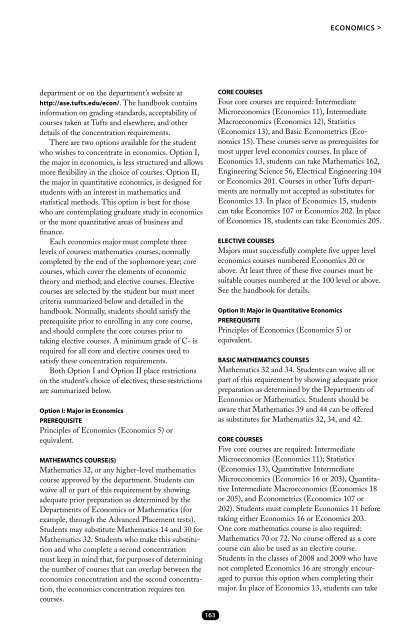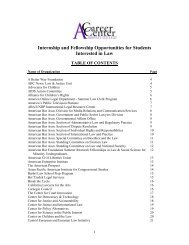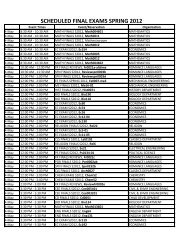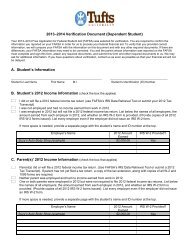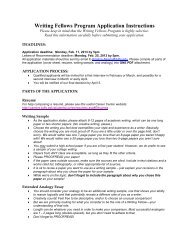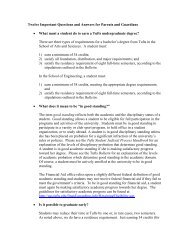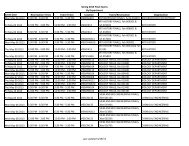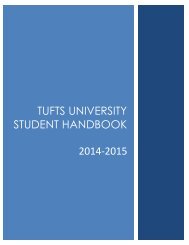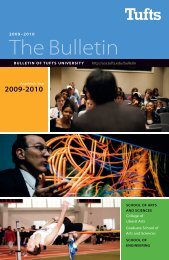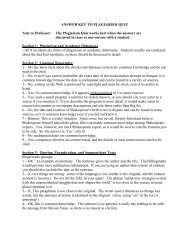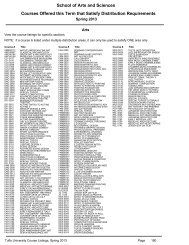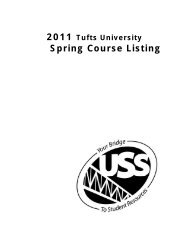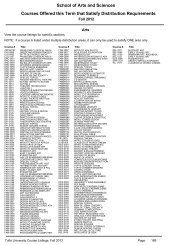2013â2014 The Bulletin - USS at Tufts - Tufts University
2013â2014 The Bulletin - USS at Tufts - Tufts University
2013â2014 The Bulletin - USS at Tufts - Tufts University
You also want an ePaper? Increase the reach of your titles
YUMPU automatically turns print PDFs into web optimized ePapers that Google loves.
Economics ><br />
department or on the department’s website <strong>at</strong><br />
http://ase.tufts.edu/econ/. <strong>The</strong> handbook contains<br />
inform<strong>at</strong>ion on grading standards, acceptability of<br />
courses taken <strong>at</strong> <strong>Tufts</strong> and elsewhere, and other<br />
details of the concentr<strong>at</strong>ion requirements.<br />
<strong>The</strong>re are two options available for the student<br />
who wishes to concentr<strong>at</strong>e in economics. Option I,<br />
the major in economics, is less structured and allows<br />
more flexibility in the choice of courses. Option II,<br />
the major in quantit<strong>at</strong>ive economics, is designed for<br />
students with an interest in m<strong>at</strong>hem<strong>at</strong>ics and<br />
st<strong>at</strong>istical methods. This option is best for those<br />
who are contempl<strong>at</strong>ing gradu<strong>at</strong>e study in economics<br />
or the more quantit<strong>at</strong>ive areas of business and<br />
finance.<br />
Each economics major must complete three<br />
levels of courses: m<strong>at</strong>hem<strong>at</strong>ics courses, normally<br />
completed by the end of the sophomore year; core<br />
courses, which cover the elements of economic<br />
theory and method; and elective courses. Elective<br />
courses are selected by the student but must meet<br />
criteria summarized below and detailed in the<br />
handbook. Normally, students should s<strong>at</strong>isfy the<br />
prerequisite prior to enrolling in any core course,<br />
and should complete the core courses prior to<br />
taking elective courses. A minimum grade of C- is<br />
required for all core and elective courses used to<br />
s<strong>at</strong>isfy these concentr<strong>at</strong>ion requirements.<br />
Both Option I and Option II place restrictions<br />
on the student’s choice of electives; these restrictions<br />
are summarized below.<br />
Option I: Major in Economics<br />
PREREQUISITE<br />
Principles of Economics (Economics 5) or<br />
equivalent.<br />
MATHEMATICS COURSE(S)<br />
M<strong>at</strong>hem<strong>at</strong>ics 32, or any higher-level m<strong>at</strong>hem<strong>at</strong>ics<br />
course approved by the department. Students can<br />
waive all or part of this requirement by showing<br />
adequ<strong>at</strong>e prior prepar<strong>at</strong>ion as determined by the<br />
Departments of Economics or M<strong>at</strong>hem<strong>at</strong>ics (for<br />
example, through the Advanced Placement tests).<br />
Students may substitute M<strong>at</strong>hem<strong>at</strong>ics 14 and 30 for<br />
M<strong>at</strong>hem<strong>at</strong>ics 32. Students who make this substitution<br />
and who complete a second concentr<strong>at</strong>ion<br />
must keep in mind th<strong>at</strong>, for purposes of determining<br />
the number of courses th<strong>at</strong> can overlap between the<br />
economics concentr<strong>at</strong>ion and the second concentr<strong>at</strong>ion,<br />
the economics concentr<strong>at</strong>ion requires ten<br />
courses.<br />
CORE COURSES<br />
Four core courses are required: Intermedi<strong>at</strong>e<br />
Microeconomics (Economics 11), Intermedi<strong>at</strong>e<br />
Macroeconomics (Economics 12), St<strong>at</strong>istics<br />
(Economics 13), and Basic Econometrics (Economics<br />
15). <strong>The</strong>se courses serve as prerequisites for<br />
most upper level economics courses. In place of<br />
Economics 13, students can take M<strong>at</strong>hem<strong>at</strong>ics 162,<br />
Engineering Science 56, Electrical Engineering 104<br />
or Economics 201. Courses in other <strong>Tufts</strong> departments<br />
are normally not accepted as substitutes for<br />
Economics 13. In place of Economics 15, students<br />
can take Economics 107 or Economics 202. In place<br />
of Economics 18, students can take Economics 205.<br />
ELECTIVE COURSES<br />
Majors must successfully complete five upper level<br />
economics courses numbered Economics 20 or<br />
above. At least three of these five courses must be<br />
suitable courses numbered <strong>at</strong> the 100 level or above.<br />
See the handbook for details.<br />
Option II: Major in Quantit<strong>at</strong>ive Economics<br />
PREREQUISITE<br />
Principles of Economics (Economics 5) or<br />
equivalent.<br />
BASIC MATHEMATICS COURSES<br />
M<strong>at</strong>hem<strong>at</strong>ics 32 and 34. Students can waive all or<br />
part of this requirement by showing adequ<strong>at</strong>e prior<br />
prepar<strong>at</strong>ion as determined by the Departments of<br />
Economics or M<strong>at</strong>hem<strong>at</strong>ics. Students should be<br />
aware th<strong>at</strong> M<strong>at</strong>hem<strong>at</strong>ics 39 and 44 can be offered<br />
as substitutes for M<strong>at</strong>hem<strong>at</strong>ics 32, 34, and 42.<br />
CORE COURSES<br />
Five core courses are required: Intermedi<strong>at</strong>e<br />
Microeconomics (Economics 11); St<strong>at</strong>istics<br />
(Economics 13), Quantit<strong>at</strong>ive Intermedi<strong>at</strong>e<br />
Microeconomics (Economics 16 or 203), Quantit<strong>at</strong>ive<br />
Intermedi<strong>at</strong>e Macroeconomics (Economics 18<br />
or 205), and Econometrics (Economics 107 or<br />
202). Students must complete Economics 11 before<br />
taking either Economics 16 or Economics 203.<br />
One core m<strong>at</strong>hem<strong>at</strong>ics course is also required:<br />
M<strong>at</strong>hem<strong>at</strong>ics 70 or 72. No course offered as a core<br />
course can also be used as an elective course.<br />
Students in the classes of 2008 and 2009 who have<br />
not completed Economics 16 are strongly encouraged<br />
to pursue this option when completing their<br />
major. In place of Economics 13, students can take<br />
163


